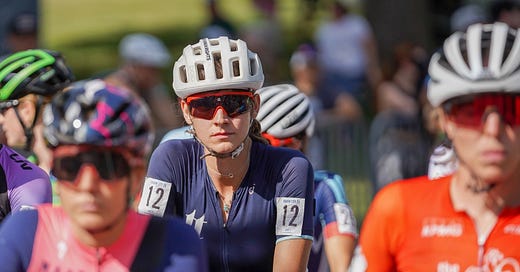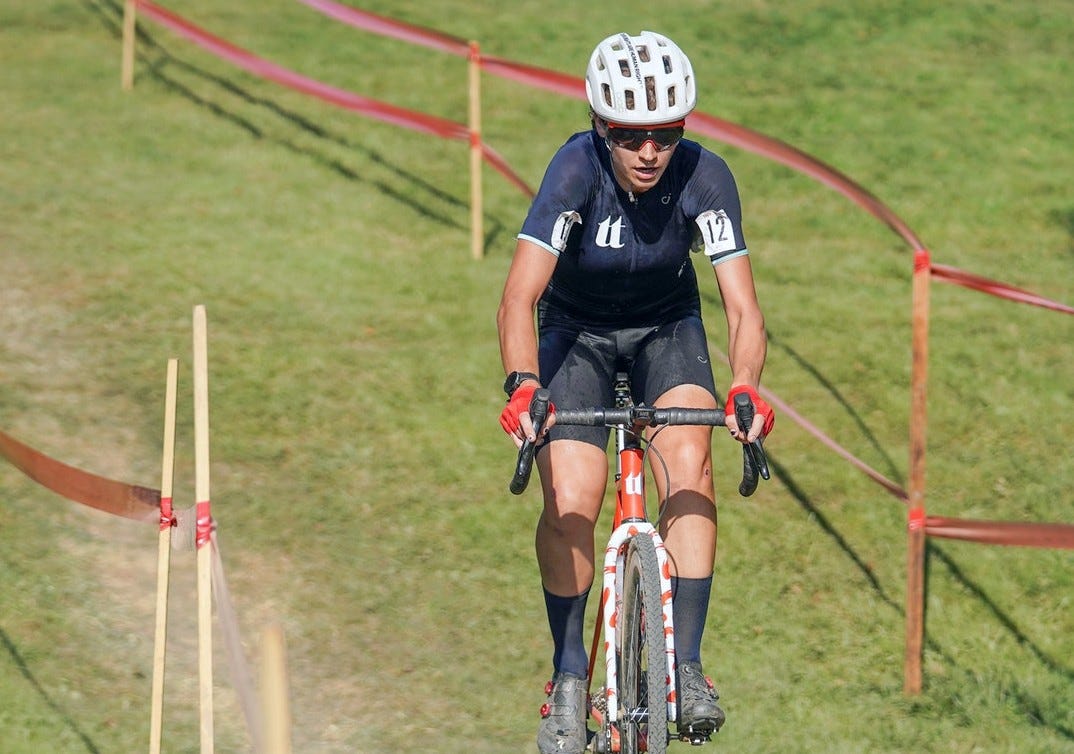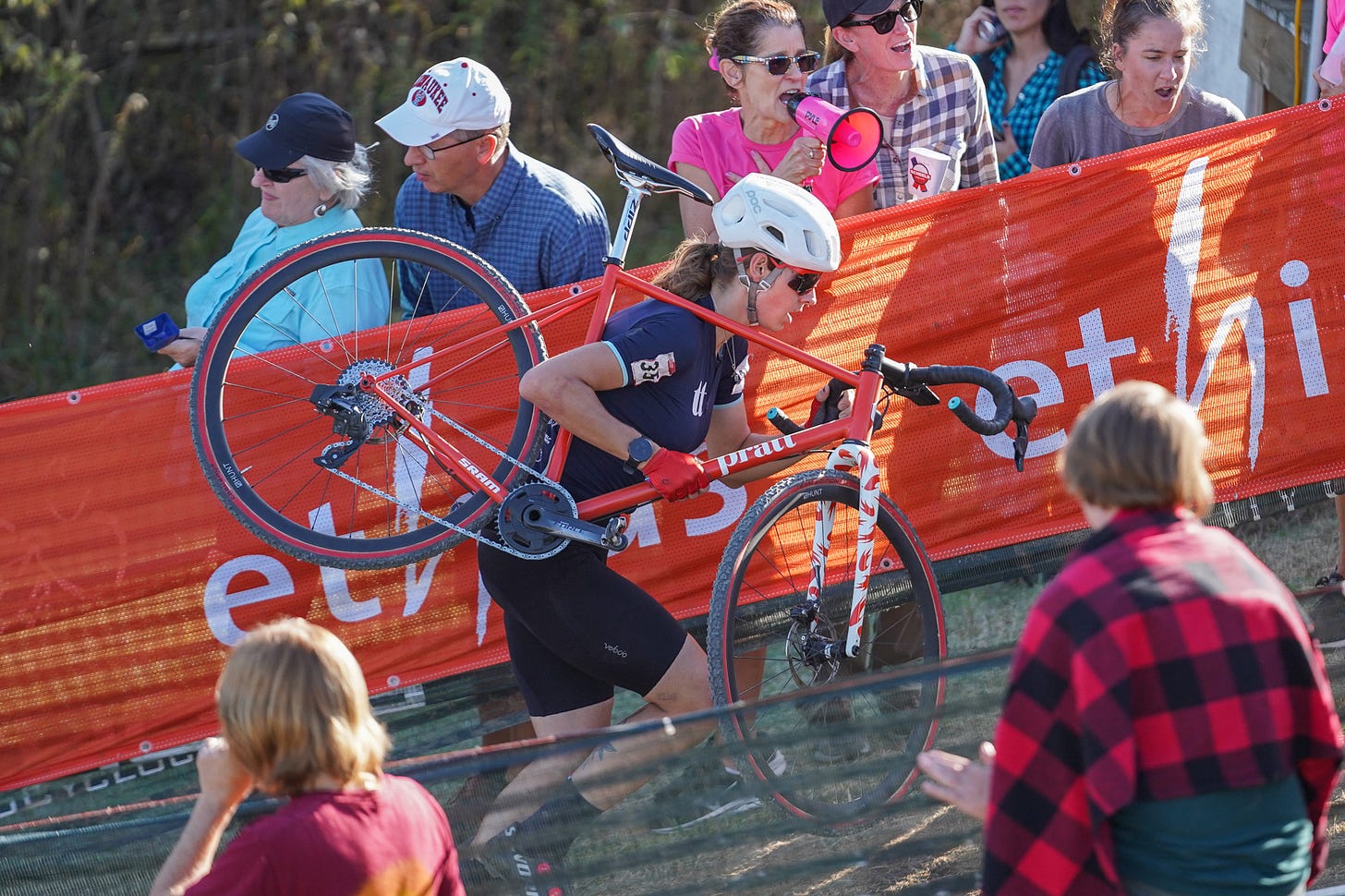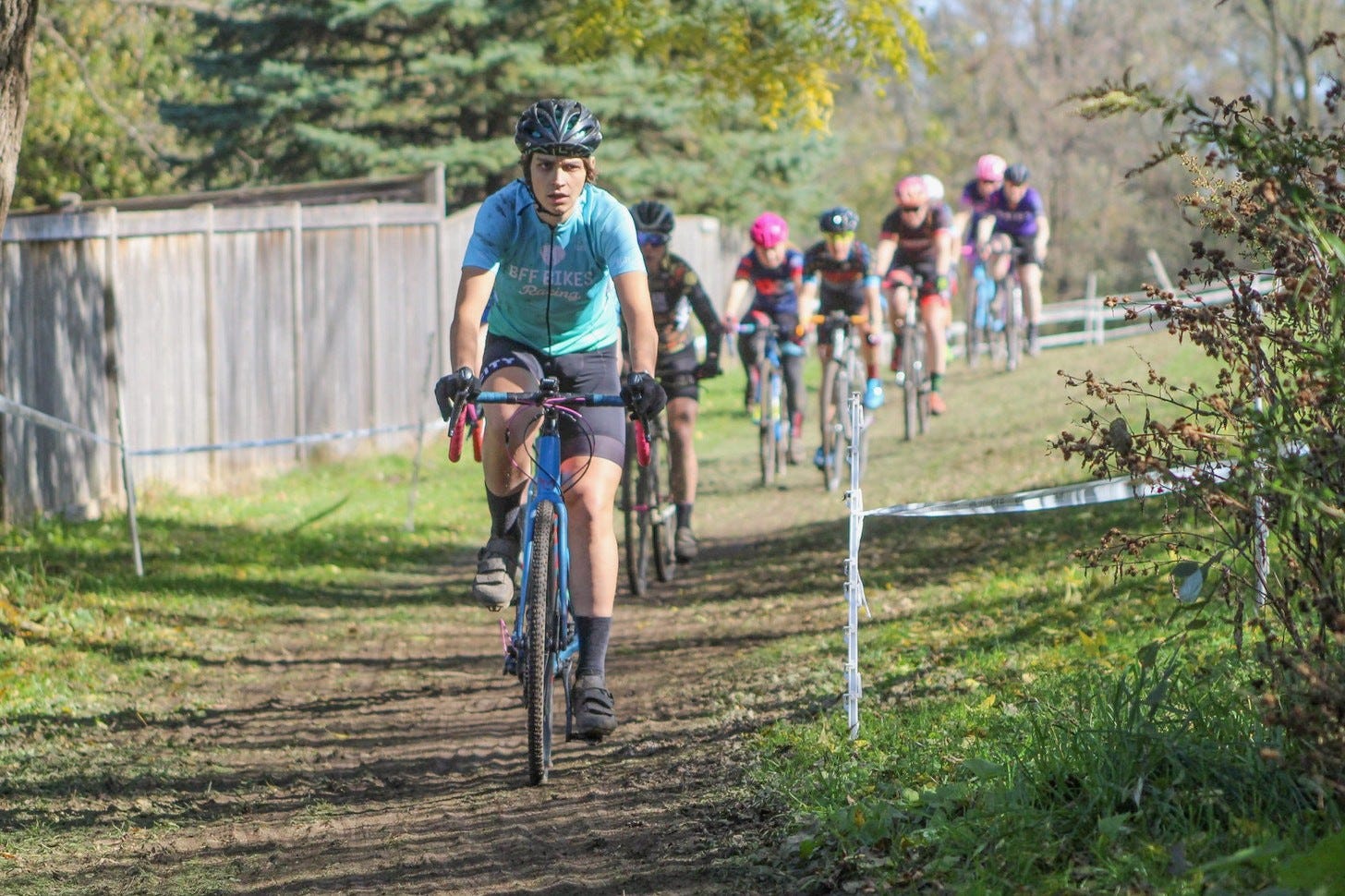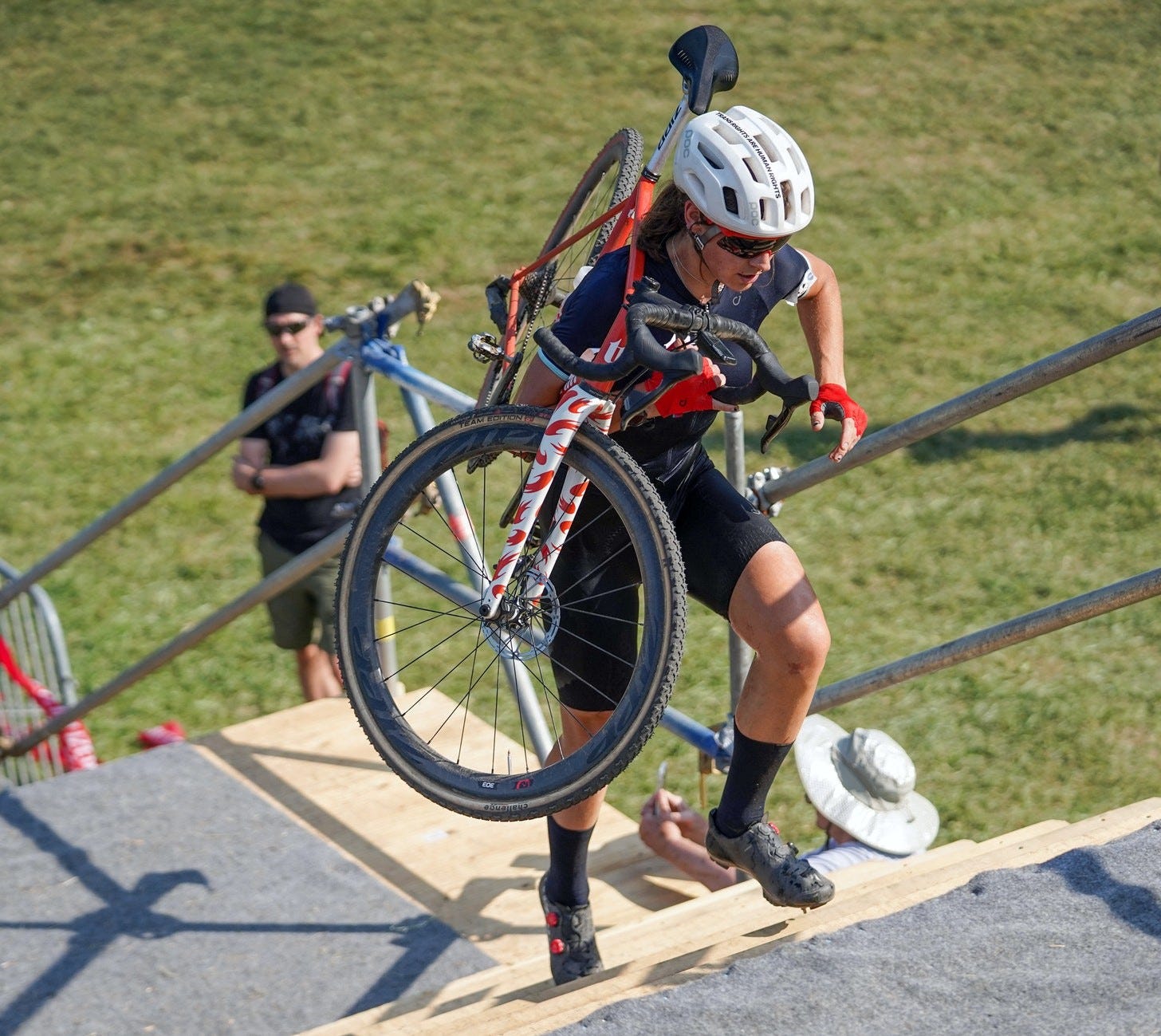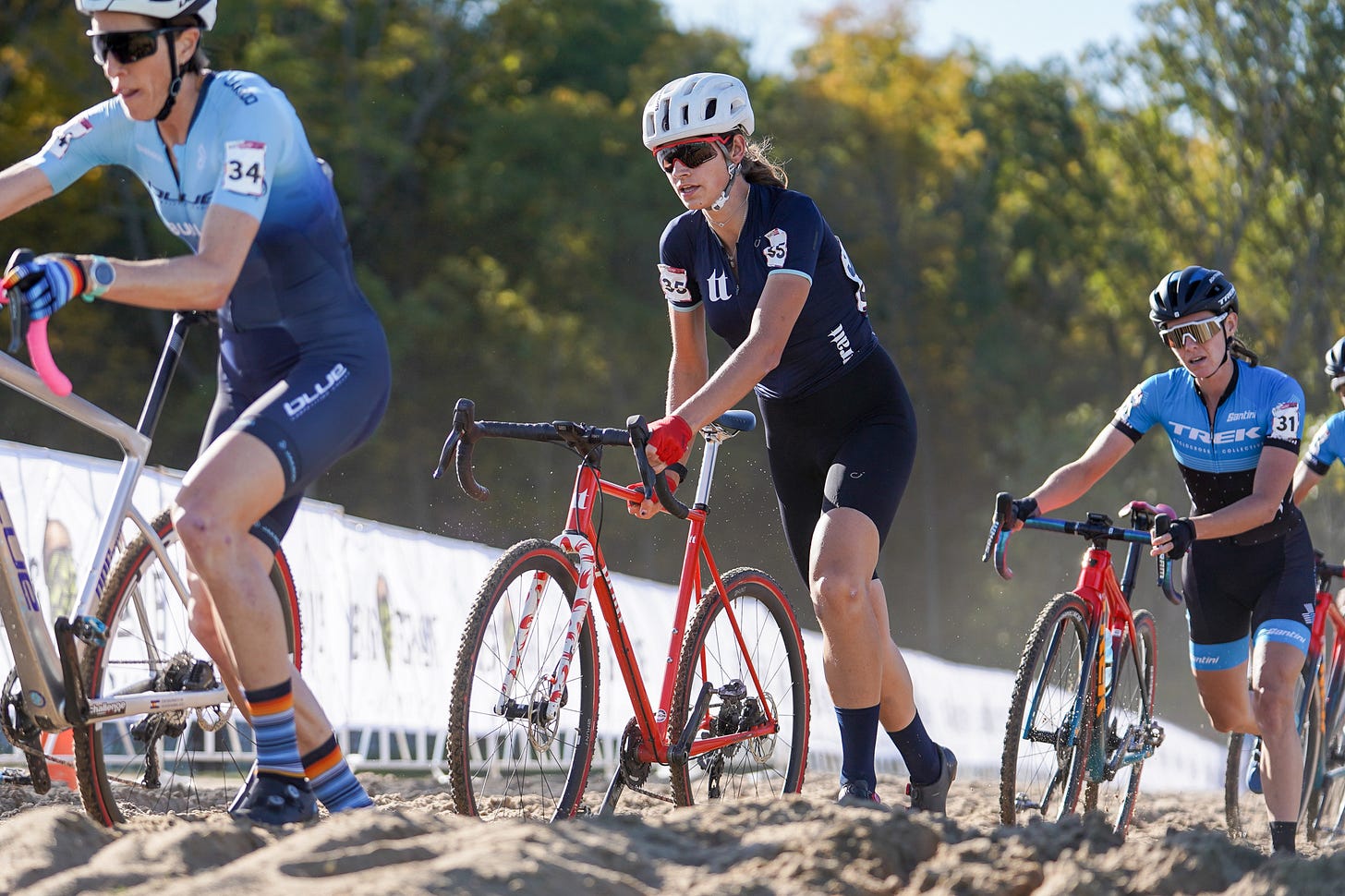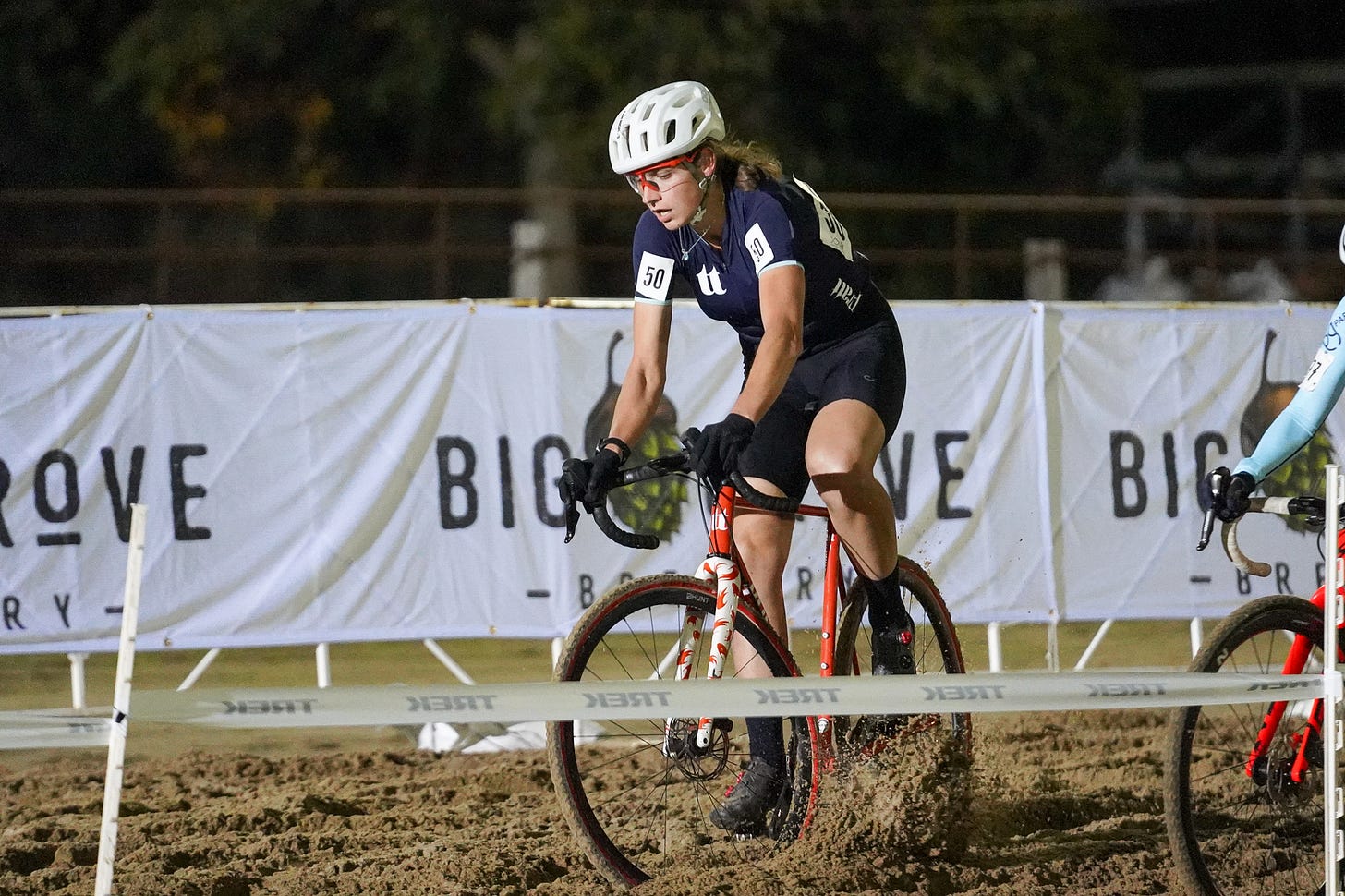In First World Cup, Austin Killips is More than Just a Bike Racer
The Chicago racer likely became the first American trans woman to race in the Elite Women's field at Jingle Cross on Sunday
Prior to the start of the 2021 cyclocross season, Bulletin subscriber Jeremy Bloyd-Peshkin reached out to remind me to keep an eye on Chicago resident Austin Killips this coming cyclocross season. He was admittedly being a bit of a Midwest homer, but he was also onto something.
Killips experienced fast cyclocross success in the Chicago Cross Cup in 2019, going from a Cat 4 beginner up to Cat 2 during the season. After her success in the local scene, Killips received an opportunity from Pratt Frameworks of Rhode Island to join the traveling cyclocross circus at the UCI level this season.
The season has gone well for Killips thus far, even if the learning curve has been intense. “We've gone 0 to 100 this year,” she said. Killips scored an 8th-place finish the opening weekend at GO Cross and finished in the top 15 at Rochester and Charm City.
Killips’ success earned her a spot on the U.S. team for the Jingle Cross World Cup on Sunday. The race was, needless to say, an experience. “I thought the wall of sound as you went through tent row at Charm City was crazy, but oh my god, Mt. Krumpit and even that start line was wild,” she said shortly after the race. She went on to finish 36th in her first go at World Cup racing.
If you’re wondering why we are featuring an interview with Killips, not only did she race her first World Cup at Jingle Cross, but she also became, as far as we can tell, the first American trans woman to race in the Elite Women’s field at a cyclocross World Cup. I asked Killips if she felt her start at the Jingle Cross World Cup was a big deal.
“I do think it's significant and notable. You know, when I'm at bike races and have other queer and trans folks come up to me, it's super meaningful,” she said.
I had wanted to do an interview with Killips for a few weeks now, and fortuitously, she stopped to say hi during pre-ride on Sunday—she’s a Bulletin subscriber, after all—and we set up an appointment to chat following Sunday’s race. I sat down with her in the Pratt tent for an interview about the race, her background in cycling, and the issue of trans rights and cycling.
Zach Schuster: You raced a World Cup today. How did it go?
Austin Killips: It went well. I wanted to finish on the lead lap, which I didn't make, but I raced the race I wanted to race. I feel like I executed on the things I wanted to do. I basically picked the hills as the place to attack and pick up spots, and I did that every lap. My legs felt terrible on Friday, so I was pretty nervous and apprehensive about racing my first World Cup. I was like, I'm on terrible form, what's going to happen? I started like dead last in the seventh row with two other people, and just raced a bicycle race and tried to pick people off.
It's a completely different energy. I mean I thought the wall of sound as you went through tent row at Charm City was crazy, but oh my god, Mt. Krumpit and even that start line was wild. It hits differently.
Zach Schuster: Have you ever done Jingle Cross before? Or was this your first time?
Austin Killips: This was my first time.
Zach Schuster: Oh wow, that's quite the first time of doing Jingle Cross, doing the World Cup.
Austin Killips: Friday was my introduction and today was ... yeah.
Zach Schuster: When did you start racing 'cross?
Austin Killips: 2019.
Zach Schuster: Ah ok, I remember seeing you in the Chicago Cross Cup races doing really well. Why did you decide to stick with it?
Austin Killips: 'Cross just has this really special energy and sense of community. I think in Chicago in particular our 'cross scene is our strongest scene. Everyone shows up to the races, a bunch of different teams work to put them on across the state. There's just a lot of community and energy behind it.
Prior to cycling, I was a freestyle skier. I mean, it's hard to completely bridge the gap between the two, but finding lines and committing to ruts and doing dumb things on bikes really kind of captures the same spirit of jumping on rails and doing dumb things on skis. It filled that void in my life.
I kind of did everything this summer. Gravel, track, crits, road, and I wasn't sure if 'cross just stuck because it's the first thing I did, but it's magical. 'Cross is so much fun. It's so dynamic. Something I felt like this summer was in cyclocross, you're kind of racing the course along with racing other people. You have your own relationship with certain features and certain elements on the course, and you don't always get that in crit races and even some of the gravel races. Even gravel, you just get in a group and pedal hard for a long time.
I've raced a new course every week this year. It's fun to get out there and be like, this is scary. Let's dial it in. It becomes a battle with yourself and the course and everyone around you. Which is a really fun collection of things to navigate.
Zach Schuster: Why did you make the decision to race the national scene this year? I mean, you could have stayed home and raced Elites in Chicago this year.
Austin Killips: In 2020 I reached out to Pratt when they decided to go all-in on 'cross. And they basically offered the resources and support necessary to do the full UCI calendar. It's not an opportunity everyone gets, having somebody say we can do this for you is incredible. I'm trying to not take it for granted, and I'm really grateful for the resources to get out and race and get as much experience as I can.
I think after GO Cross, while I think it would be fun to race local and hang out with friends, but the level of competition here is what you need to progress and get better.
Zach Schuster: Didn't you finish 8th one of the days there? You had a really good weekend.
Austin Killips: Yeah, I had an 8th-place finish.
Zach Schuster: I think it would be hard to go back to racing in Wisconsin and Chicago if you can perform at that level.
Austin Killips: Yeah, and these courses are just so much fun. The people making local courses, I am grateful for them and they do what they can in flat-as-a-pancake Illinois, but these courses are just something else. Rolling up to Rochester, up at Double Trouble, that was probably the first time I was afraid of a feature. It was scary, and I wasn't sure about it. I speed-checked it a few times, and I was like, I need more of that. That's just what you need to get better.
Zach Schuster: So how was the Mt. Krumpit descent? When you come out from the backside and go down the front side of the hill.
Austin Killips: I loved that. I've really been working on that off-camber stuff this year. I definitely found the speed limit yesterday when I was pre-riding. I felt a little apprehensive then. I was honestly a little worried because it's been so dry. Other than Fayetteville, which I wasn't at, it's been a very dry season. The men had already been up there, and it might be super loose and dusty, but there was a lot of grip.
Zach Schuster: Come back in November if it ever happens again.
Austin Killips: I can't imagine what it's like with the freeze-thaw going on. I love that. I thought I was the only one, but talking to other racers, the last descent, the last off-camber into the barn ... that was scary. That was gnarly.
Zach Schuster: It's less worse than it used to be.
Austin Killips: Since I haven't raced these courses before, I'm sitting on the internet watching all of Bill's course walk videos. It seems like they were just like, let's just make this fast. Let's make this as fast as we possibly can. There were so many twisty sections in years past that they seem to have omitted this year. I think that's why you're seeing slightly shorter lap times. People were just motoring. I mean, I think it's fun. I thought the course raced quite well. I'm biased, I like a course with a hill, and I enjoyed it.
Zach Schuster: Which is funny because you're from Chicago.
Austin Killips: I do what I can to get out and ride hills. We've got the Driftless Region in far western Illinois.
Zach Schuster: I saw in the first lap you were running the sand, but you were in traffic. I'm guessing there's a lot of those nuanced skills you've had to learn this year, huh?
Austin Killips: Yeah, we've gone 0 to 100 this year. I generally like sand and feel quite confident in it. But it's one of those things where I feel like as soon as I'm losing energy riding, it's better to run and pick up spots. I'd rather not burn matches. Starting that far back makes it hard too. You kind of have to expect that certain technical features are going to be more difficult when there's so much traffic. It's cool to be able to cut off the main line and ride it, but I don't know if that's the best use of energy some time. I don't really mind running, so I'll happily commit to the run and sprint it.
Mt. Krumpit though, that was a test. I feel like we've had a handful of run-ups this year, but that was just like, wow.
Zach Schuster: It was awful walking up it too.
Austin Killips: I felt like I was walking up it during the race. I was impressed to see people riding it. I feel like I see people sessioning features like that even if they don't plan on riding it in the race, and I think I need to be more mindful of getting out and doing that, and even if you can't get it dialed by race time, just being mindful that that's what the top level of the sport is doing. You have to make sure you're practicing that. I mean, it's clearly rideable.
Zach Schuster: You were on our podcast earlier this year about the Arkansas anti-trans bill. What are your thoughts on everything that's happened since then? It seems like it was a big thing, we just went to Arkansas, we didn't really hear much about it.
Austin Killips: Yeah, VeloNews reached out and they wanted to run another article to kind of remind people that this was a big topic of conversation a few months ago. Such is the nature of the world we live in, things are always happening and they're happening really fast. It's easy to forget about that stuff.
It doesn't seem like people aren't acknowledging the elephant in the room. I think we're seeing lots or the RIDE armbands out here, and I definitely feel a lot of solidarity and support in the field I'm racing. I love our field, and I've gotten super close with our little traveling circus of cyclocross going across the country.
On the personal level, other than some stuff that went down at GO Cross, it's been an awesome and welcoming community. I think it's almost hard to make Fayetteville the center of it now. There's been so many of these bills that have passed in legislatures across the country. We just saw a bill get passed in Texas. It's definitely concerning and worrying. I am grateful I have friends who are working in the realm of pure politics moreso than just being out here and trying to connect with people and doing social stuff. So having people going and speaking to legislators, I am grateful there are people out there doing that work.
But yeah, it's weird. It's the culture war issue of the moment.
Zach Schuster: So I know at Road Nats, Clara was wearing the RIDE armband, and she's a leader in the community, but it seems like you've gotten a lot of support from Chicago as well. Like Jeremy Bloyd-Peshkin reached out to me and was like, you need to watch her, and I was like, dude, I know who Austin is don't worry. It seems like the Chicago community has been really supportive.
Austin Killips: Honestly, I wouldn't show up if I didn't feel a sense of community and connection and solidarity I am racing with. Sports have always been a place where I make friends. It's how you connect with people. I wouldn't keep coming back if I didn't feel that. Chicago is filled with so many angels and sweethearts. I heard many people here screaming on the sidelines today.
Zach Schuster: Do you feel like you racing today was a big deal, in light of what's happened? Is this kind of momentous, or are you just a bike racer?
Austin Killips: I think the gravity of it kind of has set in. I haven't pored over records, but I think I'm the first trans woman to race a World Cup in the Women's field. I know Molly [Cameron] has raced, but she's always raced the Men's category.
I do think it's significant and notable. You know, when I'm at bike races and have other queer and trans folks come up to me, it's super meaningful, and I guess I'm very aware you can't just separate the two out. When I'm training and racing, I'm just a bike racer. I'm out here competing with these people.
But I think our team's vision and project is to be more than just a bike racing team. We're invested in building a more inclusive and welcoming sport. I'm learning what the balance between the two is, but I don't think I can make a hard-line distinction and say I'm just an athlete. I think it's very meaningful to know it matters to kids and other people out there.
I mean going out to Rebecca's Private Idaho and having people go, hey I know you. I follow you on Instagram. That's super cool. That was kind of a surreal moment. I remember calling my girlfriend and saying, this is a thing that's happening and it's weird. Whether you like it or not, I'm a public figure of some sort in our small little sport.
Zach Schuster: I think for a lot of us as straight males, it's been difficult to know how to approach the issue, but with Molly founding RIDE, there was at least this one way you could show support. I think there were a lot of people who wanted to know how they could be supportive without screaming at Wal-Mart or something. It's good to hear from you, you're ok with that, I guess?
Austin Killips: Totally. I mean how do you make meaningful political change? How do you make meaningful social change? It's a complicated question. It's kind of an age-old question. In some regards it seems like these cultural shifts just happen, and it's hard to pinpoint the interventions and actions that were the things that moved the needle.
I remember first seeing the armbands, I remember thinking, maybe this is just a performative gesture. But increasingly, there's this sense that damn, there's a lot of people out here trying to offer acknowledgment. It's almost easier to do that than have an interaction where someone is like, "I am an ally." I don't know, they're nice to see. Seeing that is more meaningful than I expected it to be when they first came out.
Zach Schuster: I felt the same way, but maybe it's because coming from Molly, she's really stepped up and made this a cause and she's been amazing. She was like, "Do this." With that, there's a sense that it's a tangible thing you can do. I thought Clara being off the front of the National Road Race wearing the armband was awesome.
Austin Killips: It ruled. It's meaningful. Especially because there are photos that get out. There's video that gets out. People see it, and people are like, this is a precedent being set at the highest level of the sport that they're cool and okay with it. It's super meaningful, and I appreciate it dearly. I appreciate everything Molly has done. And honestly, you're not alone in asking the question, what can we do? We have met and talked, and we've been trying to figure out where we can make a change. What does an action plan look like for this kind of stuff? It's hard.
Zach Schuster: Thanks for taking the time to chat with me. I've been wanting to get to chat with you, and I think this was the perfect time. Congrats again.
Austin Killips: Yeah, thank you. I really appreciate everything you are doing to cover the sport.


